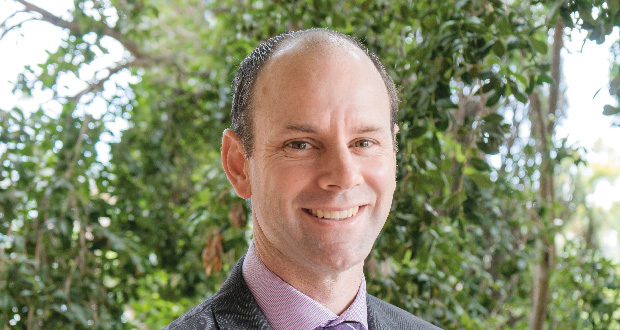It can be one of the big chapters in a young person’s life—the transition from high school to tertiary education—but what happens to a young person’s faith as they encounter social and academic freedoms like never before? Raymont Residential College Principal Richard Niessl explores how to ensure high school is not the end of the road for a young person’s faith.
Central to the identity of universities across the globe is the notion of “freedom”. The emphasis is usually placed on academic freedom, that is, the idea that students and academics have the freedom to question established norms, to challenge world views and test scientific theories as part of their quest for new knowledge.
Yet along with this notion of academic freedom, a smorgasbord of social freedom is also available to university students, in many cases for the first time.
First year students have the freedom to choose their career pathways, study programs, living arrangements, social life, personal values and most importantly their worldviews. For many, this is a time in which they will decide whether to persist with their Christian faith or choose a new path for their lives.
While the opportunity to experience new found freedom can be a wonderful experience for many, it can also be a time in which students find their commitment to faith in Christ under severe strain.
It seems that the freedom offered in so many areas of life coincides with many young students abandoning their involvement in church and Christian community. Instead of growing in faith, researchers in the United States claim that 65 to 80 per cent of Christian students “drop-out” from regular involvement in church after they leave high school.
It seems that the opportunity to explore new possibilities can be exhilarating, perhaps even overwhelming, leading many students to leave their Christian communities and turn from their faith.
This article will examine the research available on the declining rate of church attendance by university students before looking at why this occurs and what can be done to improve this situation. Issues such as social disruption, a desire to “fit in”, adjusting to new found freedom and isolation all contribute to this problem. In contrast, encouraging students to self-identify as a Christian while at school, improved critical thought, greater intentionality, better use of role models and an extended transition period could all help to improve the transition of Christian students from high school to university, enabling this period to be a time of joyful growth rather than painful loss.
Statistics
First I think it’s important to better understand the statistics that are often cited when discussing the transition of Christian students from High School to University. Many would have heard of the alarming statistic from United States-based Christian researchers such as George Barna “that 65 per cent of high school students stop attending church after they commence university [Footnote 1]”. A similar statistic appears in USA Today, which claimed that “seven in 10 Protestants aged 18 to 30—both evangelical and mainline—who went to church regularly in high school said they quit attending by age 23 [Footnote 2]”. Other denominations have undertaken their own research and concluded that the “drop out” rate for attendance at church amongst university students in some parts of their community was as high as 80 per cent.
While these statistics originate in the United States, there is little relief offered by similar research conducted in the United Kingdom. According to the authors of the 2013 book, Christianity and the University Experience, 39.2 per cent of all self-identifying Christian students ceased involvement with United Kingdom churches while at university, and this figure was 48.3 per cent for Roman Catholics while notably lower at 13.9 per cent for evangelical/Pentecostal students [Footnote 3]. Moreover, “for around a quarter [of those surveyed], church involvement is significantly lower [while at university] than when they are at home during vacations [Footnote 4]”.
Frustratingly, the insights provided by American and British researchers is not replicated in Australia and so we can’t point to the precise statistics that George Barna and his British peers use. However, we do have substantial anecdotal evidence from those working with Australian university students and recently published results from the leading Christian research agency McCrindle, which confirms a significant reduction in church attendance across the broader Australian population. [Footnote 5] For instance, we know that the rate of church attendance has dropped from 36 per cent in 1972 to 15 per cent in 2014 [Footnote 6]. Moreover, the latest census data revealed that the fastest growing religion in Australia was actually, “No Religion”.
It would therefore be fair to suggest that the issue of declining church attendance by university students is as much of an issue in Australia as it is in the United States and United Kingdom. Clearly, the transition period from high school to university is very challenging for many Christian students and perhaps Christian parents, schools and churches need to take this issue more seriously.
Why students turn away
Realising that a substantial number of students choose to cease church involvement during their university studies is one thing, but understanding why is even more important. Despite differences in geography, culture and university experience, researchers in the United States, United Kingdom and Australia have identified similar factors. These included social disruption, the universal desire to “fit in”, an inability to manage newfound freedom and the depressing consequences of isolation. Understanding these factors will better equip us to understand the potential solutions to make transition a more successful experience for our Christian students.
Social Disruption and Maturity
Commencing university involves some of the most significant disruption that any person will ever face, particularly a young person. This transition normally occurs before most have fully developed the mental capacity, maturity and resilience to fully cope. According to the Mental Health Daily, our brains are not fully developed until age 25 as “the prefrontal cortex doesn’t have nearly the functional capacity at age 18 as it does at 25 [Footnote 7]”.
This has major ramifications for the complex parts of our analytical thinking including planning, decision making, impulse control, personality development and risk management. So just at the time that many 17 to 18-years-olds are still only about halfway through the mental development of their complex decision making skills, they are also dealing with choosing a career path, selecting the right subjects, making new friends and understanding the requirements of their university course. For students in regional areas, they have even more adjustments to manage including moving to a new city, saying goodbye to family, friends, church groups and their well-established community before trying to replicate these support groups in a new, crowded, busy and often daunting university campus. Young university students are required to manage a huge array of life changing circumstances at a time when their mental capacity is not fully developed. There is little wonder that many mistakes are made as students seek to navigate through so much change while still being at least five years away from completing their full mental development.
Fitting In
In contrast to the enormous change thrust upon the lives of young university students, there are some key things that remain the same. Factors like the desire to fit in, to feel valued and part of a social group remain just as important for first year students as they do for all of us. This creates an opportunity for great personal growth and the development of new supportive friendships, but it can also be a time when students join groups that they would have previously avoided due to the overwhelming desire to feel valued. If a student finds themselves in a situation in which fitting in and being valued is freely offered in a non-Christian context while the potential for Christian support is either unknown or lacking, then there is a real risk that students will accept the friendships that are readily available, even if they further isolate the student from their Christian community.
Freedom and Temptation
Added to the challenge of social disruption and the desire to fit in, young university students will be exposed to opportunities, freedoms and temptations that they have not had to previously manage. This is not a new phenomenon as William Wilberforce observed two hundred years ago:
“Think about what happens to many young people who are raised with all the benefits of prosperous parents who are cultural Christians themselves. As children, they are taken to Church where they hear the parts of the Christian message that their particular church embraces. Although it is rare in our times, maybe they even receive some measure of religious instruction at home. Eventually they leave home and launch out into the world. Some go to work, some go to College. They face temptations that they have not faced before and give into them. Their lives might get out of control with the use of alcohol, and they might give into sexual indulgence. At the least, they never read their Bible or make any attempt to develop a spiritual life. Most don’t even attempt to take what knowledge is at their disposal and form their own beliefs and convictions. They don’t learn to think… the result is an attitude toward Christianity that is not only negative but also one that is rooted in a faulty sense of intellectual superiority.” [Footnote 8]
Wilberforce could have been describing the experience of students across Australia in 2018. Students who have benefited from religious encouragement and instruction throughout school who then find themselves struggling to deal with new temptations, values and alternate belief systems. In an environment in which different world views and temptations flourish, someone who has not thought through and developed a biblical position on drinking, sexuality and faith is likely to find the desire to conform to “accepted” patterns of behaviour on Australian campuses more challenging.
Isolation
Another area that has been identified as having a negative impact on the faith of young students is the worldview of their teachers. American research claims that, “25 per cent of college professors are professing atheists or agnostics (5-7 per cent of the general [United States] population is atheistic or agnostic). Only 6 per cent of college professors said the Bible is the actual word of God. 51 per cent described it as an ancient book of fables, legends, history and moral precepts. 75 per cent believe religion does not belong in schools.” [Footnote 9]
While it is hard to know precisely the extent to which alternate views of academics are influencing university students, it is clear that the Christian values and beliefs held by teachers and staff in Christian schools are not going to be replicated within the university sector. This view is supported by British research which also found that students were often challenged by the liberal views held by their academic staff. [Footnote 10] Being one of a very few number of Christian students within university programs dominated by alternate world views can be very confronting and threaten the confidence in which some students hold their faith.
While isolation within university lecture rooms can be confronting, the sense of “feeling left out” can be even more powerful within the communities in which young students live. British researchers claimed that the issue that caused the most difficulty for Christian students was the isolation they felt following decisions not to participate in high levels of drinking and associated behaviour. By choosing to refrain from drinking, Christians were often ostracised and excluded from social groups. For many, there is a very real pressure to “join in” so as to “fit in”. Many Christian students have to walk the delicate tight rope of avoiding harmful temptations that threaten their faith at the same time as trying to fit into a new social setting and making friends with students who hold very different values. [Footnote 11]
Clearly, commencing university can be a very challenging time for young Christian men and women. They face the hurdles of managing enormous change, determining new career pathways and trying to fit in, despite the reality that their new environment will not provide the level of Christian support that so many are used to in their high schools. Making the challenge more difficult is the incomplete development of mental capacity while still wrestling with the understandable desire to feel accepted and valued. There is no doubt that for many Christian students, commencing at university is like trying to navigate a minefield blindfolded.
What can be done to support a successful transition?
Having spent some time analysing the challenges faced by young Christian university students, the potential solutions become more apparent. For instance, students need to be encouraged and enabled to self-identify as Christians before commencing university, they need to develop critical thinking skills that can enable them to defend their views on Christian values and beliefs, they need to intentionally seek and join supportive Christian communities after high school, retain and develop active role models and be given the opportunity for an extended transition period that may run for a number of years rather than the five days of a standard university orientation week.
Self Identifying Christians
Despite the outstanding benefits of being part of a Christian community both at home, school and at church, if students do not personally identify as a Christian prior to entering university the likelihood of moving away from the church will be very high. As the statistics show, approximately 40 – 65 per cent of students give up on church after commencing university in the United Kingdom and the United States respectively. If these students are not identifying as a Christian and making voluntary decisions to be involved in fellowship, bible studies, youth groups and church programs prior to university then there is a low chance of doing so after entering university. That is, there are many thousands of students attending “Christian” schools throughout Australia, and many of these students also go to church on the weekend. But, do they tell their friends that they are Christian or make voluntary decisions about faith based activities? Are these young students getting used to making hard decisions in support of their faith despite adverse impact on their friendships or reputation while still at school? If students do not see the benefit of voluntary participation and Christian decision making while in supportive high school environments, they will probably will not see the benefits after leaving school either.
A friend recently coined the phrase, “curriculum based” Christians. [Footnote 12] That is, there are thousands of students attending compulsory Christian education lessons up until the last few weeks of Year 12. Yet being compelled to attend Christian activities throughout their entire school years fails to develop a cohort of students who are practised at voluntarily choosing to be involved in Christian fellowship. New ways of encouraging senior students to self-identify as Christians need to be considered. Perhaps Year 11 and 2 students should be given the chance to “opt in” to religious education if they are so inclined rather than making it compulsory? [Footnote 13]
Admittedly, there is a risk that that some will drop out. However, given years of Christian education, extensive chaplaincy support, the encouragement of Christian teachers, the security of an active Christian school community and often a supportive family environment, the provision of a voluntary option for Christian participation within our Christian schools sounds a better proposition than trying to achieve this within a secular university environment. In doing so, students will build positive habits and confidence in identifying as Christians which they will take with them to university. Students who self-identify as Christians before attending university are more likely to seek involvement in Christian fellowship and church involvement at university than those who have only participated out of compulsion.
Critical thought
As discussed at the beginning of this article, a founding principle of university-based education is the notion of academic freedom. Freedom to question established norms, to challenge world views and test scientific theories as part of the quest for new knowledge. Underpinning academic freedom is the requirement for critical thought, that is, the ability to collect evidence, to analyse it and make judgements in a clear and persuasive manner. Yet academics are not the only ones who call us to develop critical thinking skills, the Apostle Paul expected Christians to do the same. Paul exhorted Timothy to be diligent in the reading of scripture, preaching and teaching and to “watch his life and doctrine closely”. [Footnote 14] Paul expected Timothy and all Christians to critically think about their beliefs and how these impacted their behaviour. Paul was not alone in this regard as Peter encouraged Christians to “always be prepared to give an answer to everyone who asks …” [Footnote 15] And again Paul encouraged the Corinthians to “demolish arguments and pretension that sets itself up against the knowledge of God”. [Footnote 16]
As Christians we need to have the tools and skills to be able to explain our faith, to answer tough questions, to understand why we believe and how it is to be practically applied in our lives. These tools and skills are essential in preparing our Christian students for university as they need to understand what it is that distinguishes the Christian message built on grace and faith from other worldviews. While it is wonderful to hear of students achieving incredible results with their studies, our first priority should be in providing Christian students with the ability to explain, defend and analyse their faith because it is certain that they will be called upon to do so once at university, and it won’t necessarily be in the safe confines of a classroom of friends.
Intentional Community
Both Wilberforce and more contemporary Christian researchers have outlined the impact that harmful influences can have on the lives of Christian students. Abuse of alcohol, harmful relationships and poor choices are obviously more likely in the midst of bad company. Yet we can’t assume that our Christian students will neatly fall into the right community. As described earlier, our students will face some of the greatest social disruption in their lives as they leave the familiar and supportive environment found at school. At university they will be required to choose course programs, career pathways, develop new ways of studying, make new friends and deal with the chaos of being part of a massive community of several thousand. Falling into the right group, a supportive group, requires intentionality.
As parents we often put a lot of thought into selecting the best school for our children. Many undertake extensive research, visit and then follow up with teacher interviews while getting involved as much as possible with extra-curricular activities. In contrast, perhaps not enough effort is given to guiding our students in selecting the best communities to be part of when it comes to university. Clearly, the circumstances of Year 7 students are different to that of a new university student, but then again, so are the risks. Finding the right groups, friends and church requires intentionality. Where you live, who you spend time with, even where you study will have big impacts that could be life changing. And of course, this is of a far greater magnitude for the students who have travelled from regional areas to study in a city university where they will be required to join a completely new community.
Fortunately, there are many great Christian groups at university, churches that seek to specifically support university students, chaplaincy programs and Christian residential colleges that provide a supportive and encouraging environment. But these groups represent only a small fraction of the number of campus based groups for new students to consider. They will be literally bombarded during their orientation week with groups, clubs, sporting teams, and activities to be part of. Many will be great fun but with so much going on in the first few weeks of university, a deliberate approach to settling into key groups that provide long term support will be vital.
For parents and teachers of Year 12 students I cannot recommend strongly enough the need for research. Talk to people on campus, visit a university-based church during the academic semester, have a tour of a supportive college and be intentional. The Internet can assist as a simple search of Christian groups at university campuses will shed light on what is available. A couple of Christian groups in my local area include the QUT Christian Guild [Footnote 17] while there are also national Christian groups such as the Australian Fellowship of Evangelical Students which have a presence in practically every campus, albeit under different titles such as Campus Bible Study at UNSW or FOCUS at ANU. [Footnote 18]
Role Models
Given that there is so much change in the life of our university students as they transition from high school, another important factor is to retain some elements of continuity. Steve Biddulph’s book The New Manhood, laments the absence of role models in the ever increasing urbanised world that we live in. Biddulph describes how tight knit communities valued and contributed to the development of adolescents. [Footnote 19] These communities recognised that their future survival, prosperity and growth depended upon getting this right. As such, adolescents were surrounded by role models that helped to encourage, teach, advise and hold young adults accountable for their actions. This is often not the case in modern Australia where communities are far larger, less structured and much more anonymous. Sometimes it is hard to know the people in your own street let alone the suburb and as a result, developing role models for our adolescent students can be challenging.
Despite these challenges, positive role models remain so important for young adults and greater effort needs to be invested in developing these key relationships. While young adults will desire increasing levels of independence, trusted role models can play a vital role in providing advice, offering encouragement and admonishing selfish and destructive behaviour. However, it is no easy task in developing strong role models in the lives of our young adults, and Biddulph suggests that it can take one to two years to really cement an effective role model relationship. [Footnote 20] Given the number of challenges, uncertainties and struggles that all students will face as they enter university, trusted Christian role models are of enormous importance in providing a steady source of wisdom and support.
An extended transition
Lastly I would like to caution against an approach in which the final exam, Year 12 formal or school assembly becomes the transition point from high school to adulthood. A much better approach is to build a transition plan that covers a number of years from senior high school into the first couple of years at university. The suggestions that I have made about self-identifying as Christians, developing critical thinking skills, intentionally choosing the most appropriate university or community to live in as well as developing role models cannot be achieved in a matter of weeks between the end of Year 12 and the beginning of university. These outcomes take significant time and effort, but the dividends of this level of investment can be eternally rewarding.
While it is popular for many to visit university open days and career expos, perhaps it is worth expanding our research to include the Christian groups on campus, the local churches and accommodation providers to encourage involvement in areas that will support the growing faith of young university students. Even with a comprehensive plan in place, we need to expect set-backs in the early stages of university, mistakes will be made, challenges will be faced and changes to course programs and career pathways will occur. Hence, support for such a large transition needs to continue well beyond the first few weeks at university. Deliberately planning a supportive transition to university from Year 11 through until the end of the first year is likely to be the minimum time required to help support such a significant change for a young adult. At the very least, this would provide sufficient time to research, visit, develop networks and adjust as required.
Conclusion
Research from both the United Kingdom and the United States confirms the concerning decline in church attendance by university students, with up to 40 percent of United Kingdom and 65 per cent of United States-based students choosing to opt out of church following their arrival at university.
While precise data like this is not available in Australia, the similarities of our culture and the declining rate of church attendance in this country would suggest a similar rate in Australia. This is of utmost concern because it impacts about half (possibly more) of all students who have been involved in church through their school lives. For many young adults, commencement at university coincides with the abandonment of faith.
There are many factors that contribute to this problem. Social disruption, a lack of mental maturity, an inability to manage new freedoms, isolation and temptation all have a role in leading young students away from Christian fellowship. Given these challenges, more needs to done to help prepare Christian students for university including encouraging students to increasingly self-identify as Christian while still at school, improved critical thinking skills that enable students to graciously defend their faith and greater intentionality on behalf of parents, teachers and churches in supporting Christina students to find supportive communities prior to their arrival at university. These are not easy tasks and are clearly time consuming, but the alarming statistic that about 50 per cent of all Christian students will drop out of church involvement requires a significant response. It is vital that the end of high school does not become the end of our students’ faith but that rather, students go on to flourish in Christian fellowship throughout university and beyond.
Footnotes
- Ibid.
- C.L. Grossman, “Young adults aren’t sticking with the Church”, USA TODAY, 19 March 2011. Research undertaken by Ed Stetzer from LifeWay Research, Nashville.
- M. Guest, K. Aune, S. Sharma and R. Warner, Christianity and the University Experience, Bloomsbury Academic, London, 2013, p. 92.
- Ibid., p. 196.
- “A demographic snapshot of Christianity and church attenders in Australia”, The McCrindle Blog, dated 18 April 2014 viewed at http://mccrindle.com.au/the-mccrindle-blog/a-demographic-snapshot-of-christianity-and-church-attenders-in-australia on 19 July 2017.
- Ibid.
- Mental Health Blog, “At What Age is the Brain Fully Developed?”, Mental Health Daily, viewed at www.mentalhealthdaily.com/2015/02/18/at-what-age-is-the-brain-fully-developed/ on 19 July 2017.
- W. Wilberforce, Real Christianity, cited in D. Melleby, “Why Students Abandon their Faith”, p. 3.
- N. Gross How Religious are America’s College and University Professors?, Solon Simmons, 2006 cited in J. Warner Wallace, “Are Young People Really Leaving Christianity?”, 8 January 2017, www.coldcaseChristianity.com/2016, viewed 19 July 2017.
- M. Guest, K. Aune, S. Sharma and R. Warner, Christianity and the University Experience, p. 128 and p. 134.
- Ibid, p.122.
- T. Rowbotham, “Christian High School Student Transition into University”, email exchange, 26 June 2017. Tony has over 20 years of experience in supporting campus based Christian groups and is a very experienced staff worker with the Australian Fellowship of Evangelical Students.
- Ibid.
- 1 Timothy Chapter 4, New International Version.
- 1 Peter Chapter 3, New International Version.
- 2 Corinthians Chapter 10, New International Version.
- QUT Christians–A non-denominational Christian Group on campus that aims to help Christians Thrive at University. It does this in three ways; 1. Connecting Christians. 2. Teaching the Truth of God’s word. 3. Sharing the Gospel with others. http://qutguild.com/religion/qut-christians/ site visited 27 July 2017.
- The Australian Fellowship of Evangelical Students has Christian groups in the majority of university campuses and their details are available following a quick search at https://www.afes.org.au/ site visited 27 July 2017.
- S. Biddulph, “From boy to man” in The New Manhood: The handbook for a new kind of man, Finch Publishing, Sydney, 2010, Chapter 5.
- Ibid.
 JourneyOnline
JourneyOnline







